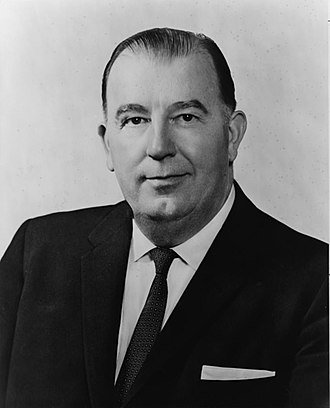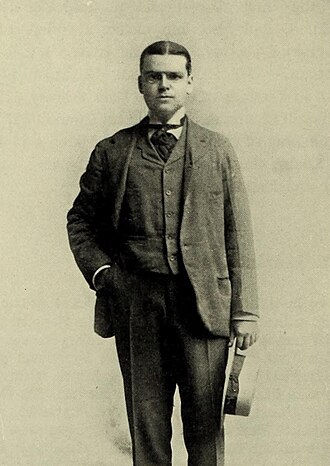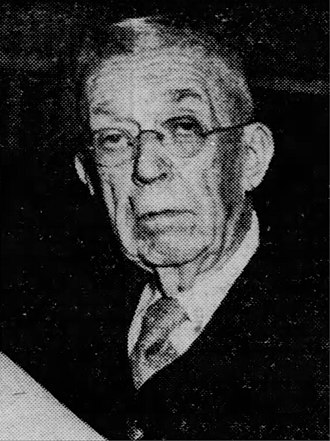Discover Your Roots
SIGN UPDiscover Your Roots
SIGN UPJennings is an English gender-neutral name with a rich historical significance. Its origin can be traced back to the early medieval period and is associated with the family of "Little John." The name is also an Anglicised version of the Irish surnames Mac Sheóinín or MacJonin. Notable individuals with the surname include a diverse range of personalities, such as actors, athletes, politicians, and historical figures. The name Jennings carries the connotation of family ties and heritage, reflecting a sense of belonging and lineage. With its English roots and gender-neutral appeal, Jennings is a name that evokes a sense of tradition and history while remaining relevant in contemporary society.

Jennings Randolph (March 8, 1902 – May 8, 1998) was a prominent American politician from West Virginia, known for his long-standing service in both the United States House of Representatives and the United States Senate. Born in Salem, West Virginia, he had a strong family lineage in politics, with both his grandfather and father having served as mayors of Salem. Randolph pursued his education at Salem Academy and Salem College before embarking on a career in journalism and academia. He eventually entered politics and served as a congressman for several terms, during which he chaired various important committees. In 1958, he was elected to the U.S. Senate, where he continued to make significant contributions, particularly in the realm of civil rights and environmental legislation. Notably, Randolph was a key advocate for the Twenty-Sixth Amendment, which granted 18 to 21-year-olds the right to vote, and played a crucial role in its ratification. Despite initial skepticism towards the Women's Liberation Movement, he eventually supported the Equal Rights Amendment. Jennings Randolph's legacy is marked by his unwavering dedication to public service and his instrumental role in shaping key legislative reforms during his extensive political career.

Jennings Michael Burch (April 27, 1941 – January 15, 2013) was an influential American writer known for his compelling best-selling autobiography, "They Cage the Animals At Night," published in 1984. Born and raised in the South Bronx, New York, Burch endured a challenging childhood spent in foster care, experiencing life in 32 different foster homes between 1949 and 1954. Despite these adversities, he went on to earn a B.A. in forensic psychology from John Jay College in Manhattan, New York City.Throughout his diverse career, Burch held various roles, including New York City policeman, chauffeur, theater manager, magazine pressman, and short-order cook. He also ventured into marriage three times and was a father to two biological daughters, one adopted daughter, and a son.Jennings Michael Burch's impactful writing and life experiences continue to inspire and resonate with many, leaving a lasting legacy in the literary world.

Jennings Stockton Cox Jr. (November 23, 1866 – August 31, 1913) was an American mining engineer credited with inventing the daiquiri in the late 19th century while working in Cuba. Born in Baltimore, Maryland, he was a descendant of early Maryland settler James Cox and a graduate of Columbia School of Mines. Cox's career included roles with the Government Survey of the Harlem Ship Canal, the Pennsylvania Steel Company, and the Spanish-American Iron Company in Cuba. The invention of the daiquiri is attributed to Cox's improvised mix of rum, lime juice, and sugar when he ran out of gin while entertaining American guests. Following his death in 1913, the cocktail gained popularity, with Admiral Lucius W. Johnson Sr. introducing it to the Army and Navy Club in Washington, D.C. Cox's legacy also includes his association with influential individuals such as writer Richard Harding Davis. His contributions to mixology and engineering continue to be celebrated today.

Jennings Bryan "Ears" Whitworth (September 17, 1908 – March 3, 1960) was a prominent figure in American college football and baseball. Known for his coaching roles, Whitworth served as the head football coach at Oklahoma State University–Stillwater and the University of Alabama, where he faced both triumphs and challenges. Notably, his coaching career at Alabama saw a winless season in 1955, marking the school's last winless season on the field to date. Despite facing obstacles, Whitworth's dedication to coaching was evident, with stints at various renowned institutions, including Alabama, Louisiana State University, and the University of Georgia. His impact extended beyond football, as he also coached baseball at Alabama and the University of Georgia, showcasing his versatility and passion for sports. Beyond his professional endeavors, Whitworth's personal life was anchored by his marriage to Virginia Ann Calvert, and he left behind a lasting legacy upon his passing in 1960. Whitworth's contributions to college sports continue to be remembered and honored, standing as a testament to his enduring influence in the realm of athletics.

Thomas Jennings Bailey (June 6, 1867 – January 9, 1963) was a distinguished United States district judge of the United States District Court for the District of Columbia. Born in Nashville, Tennessee, Bailey was the son of Elizabeth Margaret Lusk and Senator James E. Bailey. He pursued his education at the Emerson Institute, Southwestern University, and Vanderbilt University, obtaining degrees in various disciplines. Bailey embarked on a successful legal career, engaging in private practice in Tennessee and serving in various legal roles, including special commissioner and deputy clerk. In 1918, he was nominated by President Woodrow Wilson to the Supreme Court of the District of Columbia and later became a Judge of the United States District Court for the District of Columbia. Bailey's commitment to justice and the law was unwavering, as evidenced by his long and distinguished service until his passing in 1963.Beyond his professional endeavors, Bailey cherished his personal life, marrying Lucy O'Bryan and raising four children. He was an esteemed member of the Cosmos Club and the Kirkside Golf Club. Bailey's legacy continues to be remembered and revered in legal circles and beyond.
All images displayed on this page are sourced from Wikipedia or Wikimedia Commons.We use these images under their respective Creative Commons or public domain licenses. Wherever applicable, author attributions and license information are provided. If you believe an image is used incorrectly or outside its license terms, please contact us so that we can review and correct the issue.